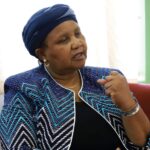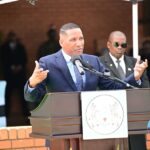GABORONE – Botswana is facing a critical threat to its national livestock industry as senior officials revealed that the country’s cordon fences—essential for controlling animal disease movement—are in a state of total disrepair. The alarming disclosure was made before the Public Accounts Committee (PAC) by Mr. Kabelo Ebineng, Permanent Secretary in the Ministry of Lands and Agriculture, during an ongoing inquiry into the country’s agricultural preparedness and financial accountability.
Mr. Ebineng, who serves as the Ministry’s Accounting Officer, warned that the deteriorated condition of the cordon fences poses a serious risk of a Foot and Mouth Disease (FMD) outbreak, especially following a confirmed resurgence of the disease in South Africa’s North West Province. He noted that the disease could easily spread into Botswana through the Borolong area and reach as far as Dibete village if immediate preventive measures are not taken.
“Our cordon fences are completely dilapidated. With the current outbreak of FMD just across the border, the risk of the disease entering Botswana has never been higher,” said Ebineng.
The Permanent Secretary also delivered a sobering assessment of the Ministry’s financial position, stating bluntly that “the country is broke” and that there are currently no funds allocated to rehabilitate the fences across affected regions. The lack of financial resources, he said, leaves Botswana’s livestock sector highly vulnerable to diseases that could have devastating economic consequences.
In a further revelation, Mr. Ebineng told the Committee that the Ministry’s controversial purchase of 141 cattle from the United States of America in May 2023—at a staggering cost of P51 million—was not budgeted for and may have been conducted outside proper legal channels.
“There is a possibility that the purchase of the cattle was unlawfully done,” he admitted, raising concerns over accountability and procurement practices within the Ministry.
The acquisition, which drew public scrutiny last year, is now under renewed investigation as lawmakers demand clarification on whether procurement regulations were followed and if the expenditure provided any measurable benefit to the local agriculture industry.
Committee members expressed concern about the growing disconnect between the Ministry’s spending and the pressing needs on the ground—particularly the urgent matter of national disease control infrastructure.
The PAC inquiry is ongoing, with Mr. Ebineng expected to provide further details about the procurement process, the condition of border protections, and potential contingency plans to prevent an FMD outbreak.
As Botswana continues to pride itself on its beef exports and disease-free status in international markets, the latest revelations have sparked public calls for immediate government intervention and greater transparency in agricultural management.









